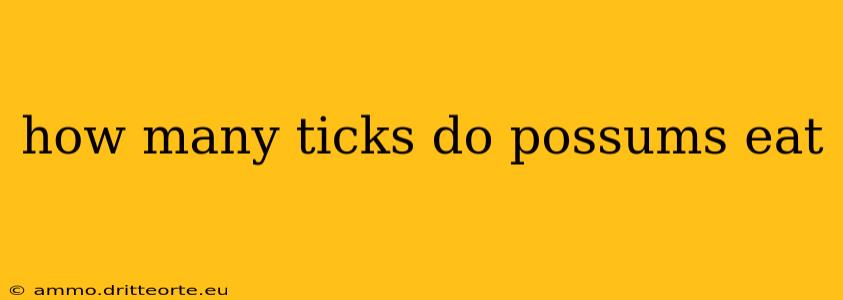How Many Ticks Do Possums Eat? A Look at the Opossum's Role in Tick Control
Possums, often unfairly maligned as pests, play a surprisingly significant role in natural tick control. The question "How many ticks do possums eat?" doesn't have a simple numerical answer. The number varies dramatically depending on several factors, including the possum's size, the abundance of ticks in its environment, and the time of year. However, research strongly supports their effectiveness as tick predators.
The Possum's Tick-Eating Habits
Unlike other animals that might selectively feed on ticks, possums are remarkably efficient at consuming a large number. Studies have shown that a single opossum can consume hundreds, even thousands, of ticks over its lifetime. This isn't a targeted hunting strategy; they simply ingest ticks while foraging for other food sources.
This voracious appetite isn't just about the ticks themselves; the possum's unique physiology plays a crucial role. Unlike many mammals, possums have a low body temperature, making them less attractive hosts for ticks. They are also adept climbers, accessing areas where ticks are concentrated.
Factors Affecting Tick Consumption
Several factors influence the exact number of ticks a possum consumes:
- Tick Population Density: In areas with high tick infestations, possums will encounter and consume more ticks. Conversely, in areas with few ticks, their consumption will naturally be lower.
- Possum Population: A larger possum population in a given area directly correlates to a greater overall reduction in tick numbers.
- Seasonality: Tick activity peaks during certain seasons, so possum consumption will mirror this fluctuation.
- Food Availability: While ticks are consumed readily, they aren't the possum's primary food source. The availability of other food sources might indirectly influence the number of ticks ingested.
The Importance of Possums in Tick Control
While the precise number of ticks a single possum eats remains variable, the overall impact of their presence on tick populations is undeniable. Their role in natural tick control is a significant benefit, reducing the risk of tick-borne illnesses for humans and other animals. Protecting and promoting possum populations through responsible land management practices can contribute significantly to natural tick control strategies.
Dispelling Myths and Understanding Possums
Many misconceptions surround possums, often leading to their unnecessary removal or extermination. Understanding their beneficial role in ecosystems, particularly their contribution to tick control, is vital for responsible co-existence. Instead of viewing them as pests, we should recognize their value as natural pest control agents.
Further Research and Conclusion
While more research is always beneficial to refine our understanding, the available evidence strongly suggests that possums are significant consumers of ticks and play a crucial role in natural tick control. Instead of focusing solely on a precise number, it's more valuable to appreciate the overall ecological contribution of these often-misunderstood marsupials. Their presence is a natural, environmentally friendly solution to a significant health concern.

